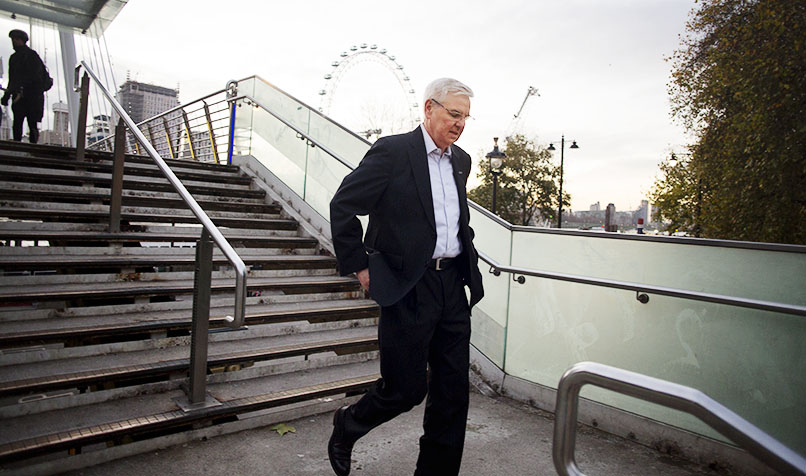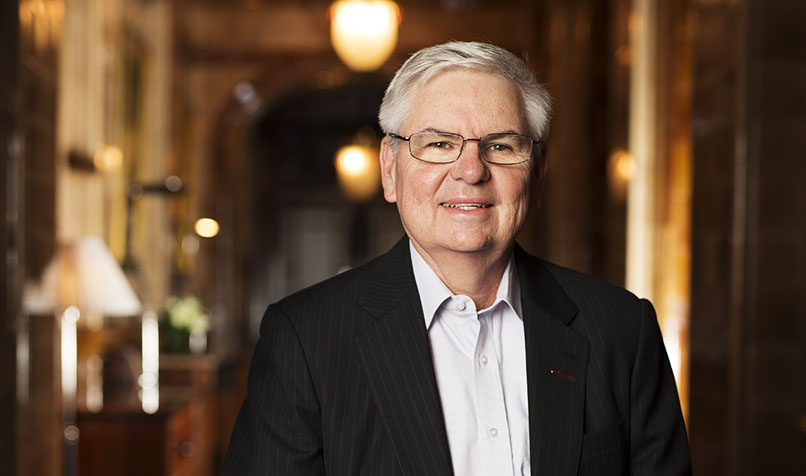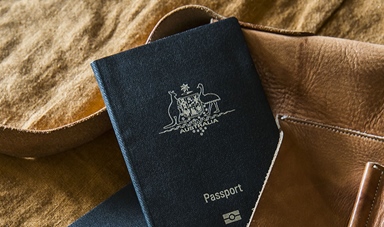Loading component...
At a glance
By Stephen Corby
You’d be forgiven for thinking Barry Melancon is conjuring a slightly dystopian vision of a future dominated by machine intelligence when he begins talking about the challenges faced by the accounting profession globally.
When he speaks of robots, artificial intelligence and augmented data analytics – things he says will “change the very essence” of the profession – he could just as easily be describing the plot for a science-fiction novel, rather than the realities of modern accounting.
Melancon isn’t describing the far-off future, he’s talking about right now.
As president and chief executive of America’s peak accounting body, the American Institute of Certified Public Accountants (AICPA) for the past 22 years – and CEO of the Association of International Certified Professional Accountants – Melancon is used to adapting to change. However, even he has never seen anything quite like this.
A rapidly transforming world
“What really keeps me motivated is that the profession is in its greatest time of transformation in our history,” he says. “It’s driven predominantly by technology, and by the changing expectations of what we do as a profession. We’re in a period in which the speed of change is almost impossible to get your arms around.
“The number-one volume job in the world, for example, is driving something – a truck, a taxi, an Uber vehicle, a delivery van – and now we’re going to have driverless vehicles. We have robots that do surgeries, revolutionising the medical profession. We have certain types of litigation being done through artificial intelligence, or augmented intelligence processes.
“In the accounting profession, things like blockchain, data analytics, and augmented and artificial intelligence will change the very essence of what we consider verification, what we consider evidence, what we consider information flow for decision-making. How we harness that is important.”
Fighting change not an option
It’s how professions adapt to those changes that is the difference between success and failure. Fighting this change, Melancon says, isn’t an option. “Our approach to change in auditing and financial management is about how, in this uncertain climate, we leverage the trust that the profession already has. We see it as a huge opportunity, but it could be a huge threat if you don’t take advantage of it.
“I wake up, and I expect all of our staff to wake up, every morning worrying about the profession, and doing the right things for the profession. We’re the largest professional accountancy body in the world, therefore we have significant leadership responsibilities and opportunities.
“We all live in a world that, no matter what we do for a living … the amount of change, and the amount of opportunity, is greater now than it’s ever been for anybody who’s ever lived, whatever you’re doing. Our profession doesn’t get a pass from that standpoint. Creating an environment where people in our profession embrace that change, and picking the right strategies for that change, is a very exciting and rewarding prospect.”
US-Australia milestone agreement

One of those strategies could have a significant impact on Australian accountants. It’s a milestone agreement that acknowledges substantially equivalent credentials for CPAs in Australia and the United States and delivers abbreviated qualification pathways. The mutual recognition agreement provides Australian CPAs with the opportunity to transfer their skills and qualifications to the US, and vice versa, unlocking huge opportunities for CPAs on both sides of the Pacific.
The deep economic and cultural ties between Australia and the US are not lost on anyone. A long-standing Free Trade Agreement is in place and the US accounts for more than a quarter of foreign investment in Australia.
Within this dynamic economic ecosystem, the enhanced professional opportunities for CPAs enabled by the new agreement are significant. Melancon emphasises that the agreement’s benefits are as important for Americans as they are for Australians.
“Clearly, in a public accounting sense, firms are becoming much more global networks. Australia, from a US perspective, is a key component in networks that include firms that operate in Australia, because American businesses are operating and selling in Australia, and vice versa.
“This agreement means an individual who is a CPA in Australia can have that designation recognised in the US, giving them the right to practise in the United States, and vice versa.
“It’s a recognition that a person ought to have a relatively easy path to working in either market, because they’re equally qualified professionals. If they move from the US to Australia or from Australia to the US, then they’re able to obtain rights to practise in their profession.”
“This agreement means an individual who is a CPA in Australia can have that designation recognised in the US, giving them the right to practise in the United States, and vice versa.”
While Melancon isn’t expecting a rush of transfers between the two countries, he says Australian accountants who do move to the US will have a different profession to get their heads around.
“We have a different regulatory structure, and that’s pretty substantive,” he says. “You would see more differences in the United States, on a state-by-state basis, and fewer nationalised answers on things like regulation, taxes and things of that nature.”
At times, the state-by-state law differences can make the US seem less of a unified country and more a collection of 50 different nations.
Appreciating all of that sounds a little daunting, but Melancon is equally quick to highlight the similarities between the two nations, pointing to the near-identical business environments and focus on higher education that will make a transition overseas significantly easier.
“There’s a lot of similarity between the American approach and the Australian approach. The business environment, or ecosystem, here is very entrepreneurial. I think the Australian business system is very entrepreneurial,” he says.
“We’re both relatively new, modern, free-market economies, and certainly the political whims ebb and flow. We’re not about barriers to doing work. In order to have businesses, we’re both about economies that enable businesses. That’s not the case everywhere in the world.”
Backed by university systems
“The professional space in Australia relies heavily on the university system. That’s certainly what an American footprint looks like, and that’s how professionals are created. You have very strong academic environments that teach the profession in Australia. You’d find that, as well, in the United States.
“I think both the professions are about the same. Yes, an Australian CPA is much more likely to go into Europe; a European CPA is much more likely to go to Australia, than a US CPA to Australia.
“But now, there is an exception to that. Because of the mining industries – oil, gas and things of that nature – on the west coast of Australia, there is more of a nexus to the United States.”
Similar or not, the doors will soon be open for our finance professionals to hone their craft in the US, and that can only be a good thing for Australian CPAs.
Barry Melancon: view from the top

Barry Melancon’s rise to the top of the world’s biggest accounting organisation reads a little like a John Grisham novel.
Made partner of a Louisiana CPA firm at just 25, Melancon was promoted to president of the state’s accountancy body at a fresh-faced 29. Finally, at 37, Melancon rose to president and chief executive of the AICPA in 1995, a position he’s held ever since.
As the head of the 650,000-member Association of International Certified Professional Accountants, which combines the strengths of the AICPA and the Chartered Institute of Management Accountants, Melancon sees it as his job to wrestle with changing technology and shape it into a strength for the entire profession, big or small, rather than a weakness.
Eligibility requirements
CPA Australia members must meet certain requirements to be eligible for the abbreviated qualification pathway that the recognition agreement provides:
- You have a bachelor’s degree or higher, conferred by an institution deemed acceptable by the US state board where you wish to practise. (Note: some state boards may require you to complete specific coursework or meet additional education criteria.)
- You have completed the CPA Program and hold a CPA designation.
- You are in good standing with CPA Australia.
- You have at least three years’ relevant work experience prior to receiving your CPA Australia designation, and at least two years and eight months of relevant work experience since being admitted as a CPA Australia member. (Note: some state boards may request specific work experience, and the way you verify such experience, for example: by working with the National Association of State Boards of Accountancy’s Experience Verification Service.)
- You meet CPA Australia’s continuing professional development requirements.
Members who acquired their CPA Australia designation through a mutual recognition agreement or reciprocal membership agreement with another professional accounting association are not eligible to follow this abbreviated qualification pathway.

